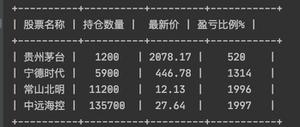【Python】Python 2.7 stdout重定向的疑问
先上代码
import sysclass TestWriter(object):
def __init__(self, stream=sys.stdout):
super(TestWriter, self).__init__()
self.stream = stream
def write(self, line):
self.stream.write(line)
tmp = sys.stdout
f = open('d:\\stdout.txt', 'w')
try:
sys.stdout = f
adpt = TestWriter() //如果这里我把f当参数传入,则执行结果如预期。
adpt.write('asdfwe') // 预期字符串写入文本,单事实上字符串输出到了屏幕。
print 'this is import from print' //如预期的输入到了文本
except Exception, e:
sys.stdout = tmp
print e
finally:
sys.stdout = tmp
f.close()
print 'finish'
问题:就如我注释里写的,调用TestWriter.write()的时候没有实现sys.stdout的重定向输出,但之后的print证明了标准输出已经重定向到了文件f对象。
断点跟踪的时候,self.stream也显示为f对象
求解惑!!!


回答
def __init__(self, stream=sys.stdout)Python在创建每个函数时,每个参数都会被绑定,默认值不会随着值的改变而重新加载
# coding: utf-8D = 2
class Test:
def __init__(self, a=D):
print a
if __name__ == '__main__':
D = 3
t = Test()
print D
inner function: 2
outer function: 3
但如果绑定参数默认参数绑定的是地址,那就不一样,地址不变,内容可以变.
# coding: utf-8D = [3]
class Test:
def __init__(self, a=D):
print "inner function: ", a
if __name__ == '__main__':
D[0] = 2
t = Test()
print "outer function:", D
inner function: [2]
outer function: [2]
In contrast, in Python, execution begins at the top of one file and proceeds in a well-defined order through each statement in the file, ...
http://stackoverflow.com/ques...
python会顺序解释每条语句,所以TestWriter的构造器参数stdout没有被重定向。
以上都是我猜的
=====================================================================
import sysclass A:
def __init__(self, stream=sys.stdout):
print(stream)
f = open('test.txt', 'w')
a = A()
sys.stdout = f
print(sys.stdout)
运行结果
以上是 【Python】Python 2.7 stdout重定向的疑问 的全部内容, 来源链接: utcz.com/a/79448.html




